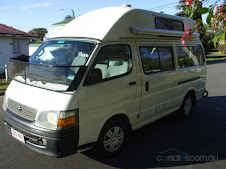
Safety considerations are a concern, though perhaps less of a concern that for campers. Any bad experience is in most cases likely to be a result of bad luck whether than systematic risk. When I reflect on my bad experiences they have arisen because of the following:
1. Exposure: If you are readily seen then there is the potential for people to cause you harm.
2. Isolation: If troublesome people some across a camper in a remote area, they are more likely to cause some injury if they sense that they can escape accountability.
3. Conspicuous: Some people like to attack that which is different. If there are some drunk guys passing a car, that is not special. If they pass a campervan they are going to reflect on it. The only place a campervan does not look conspicuous is in a camper park.
The implications for campervanners are:
1. The less conspicuous the vehicle - the less likely you will have problems. Driving around in a huge campervan attracts attention. A small camper which looks more like a delivery van than a camper will attract no attention because it is perceived as just another vehicle, and people will not expect people to be sleeping in it. In some places there are laws against living in the back of a vehicle. i.e. Public ordinances. Usually local governments and police don't prosecute on the basis of these ordinances until the practice becomes a public nuisance, or results in some grievance. This is why I suggest a smaller, work-type vehicle makes a better campervan.
2. Less isolation: When I was travelling around some people parked their campervans in industrial estates in towns. This makes sense for campervans, but ultimately I want to be located around people, so for a work-type (inconspicuous) vehicle, I am more inclined to stay in the suburbs. I would just park on-street in some quiet street, usually under a street light. In outback Australia some aborigines threw a plastic bottle at a rental I was sleeping in. no damage, but the point is - it was a rental and it could have easily been a glass bottle.
3. Avoid lawless areas: Usually lawlessness arises in low income and indigenous communities, often associated with alcohol. These problems occurs in settled areas, so if you must stay in a 'bad area', make it in a rural area where there is less likely to be people. I was staying in Katherine, NT, Australia. The local aboriginal football team won the competition and were out driving their cars drunk. I tried to sleep, but ended up at a tourist carpark next to a hot spring. It was a lovely place to have a swim the next day.
-----------------------------------------------
Andrew Sheldon www.sheldonthinks.com






